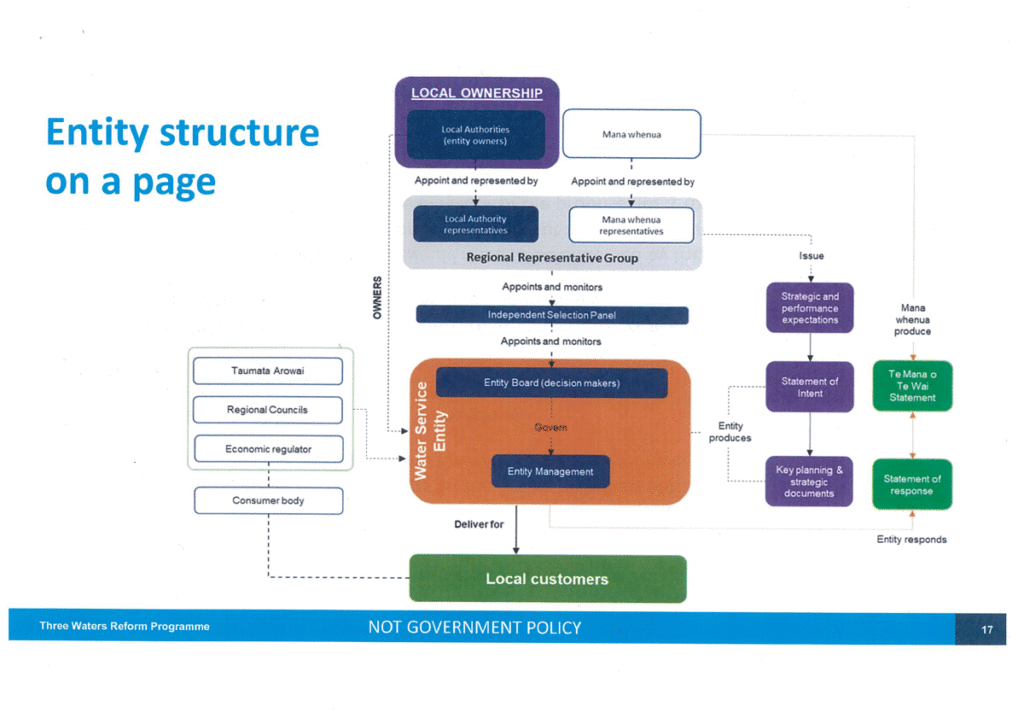
In the past week Rob Campbell, a Company Director, wrote this about business governance in Newsroom:
There are many conferences on business governance these days. Possibly in inverse proportion to any clear improvements in how business contributes to society.
This should concern us all, not least because so many non-business organisations from state to local government, to charities continue to adopt private sector governance models just as those models need to be changed.
Whether we meet the various physical crises of climate, biodiversity, and degradation or the social crises of inequality, migration and health will depend in large part on how we conduct our economic activity. That, in turn, is substantially dependent on how boards see their role.
The structure proposed above complies with this description. It is a private sector governance model. It is fundamentally flawed. I suspect developed by people who have never sat on Boards.
https://www.newsroom.co.nz/pro/time-to-hand-in-my-directors-union-card
My concerns over the proposed model above are essentially:
- how 20 Local Authorities could agree on who to appoint and the accountability mechanism of the first two purple boxes.; and
- what input 20 Local Authorities will have over the appointment of an “Independent Selection Panel”; and
- what accountability the Board will have to the Local Authorities which have had their water assets removed from them.
Now let’s consider “Taumata Arowai” which appears on the box on the left in the above wire frame.
This group will advise the supposed “independent” board and management. Here’s what the Act says about the Board of Taumata Arowai, which will be an additional organisation to the Water Service entity:
- The board consists of not fewer than 5, and not more than 7, members.
- The responsible Minister must appoint members to the board who, collectively, have knowledge and experience of, and capability in,
- the compliance, monitoring, and enforcement activities of regulatory agencies; and
- public health, particularly in relation to the objectives and functions of Taumata Arowai; and
- the Treaty of Waitangi (Te Tiriti o Waitangi) and its principles; and
- perspectives of Māori and tikanga Māori; and
- performance monitoring and governance.
Board’s power to delegate
The board may delegate any of its functions or powers in accordance with section 73 of the Crown Entities Act 2004, except the power to appoint or remove the chief executive.
Then the Board must appoint a Māori Advisory Group in addition to having Mana Whenua on the Water entity.
Māori Advisory Group established
- This section establishes the Māori Advisory Group.
- The Māori Advisory Group consists of not fewer than 5, and not more than 7, members.
Appointment of members of Māori Advisory Group
- The responsible Minister must appoint members to the Māori Advisory Group.
- The responsible Minister must consult the Ministers with portfolio responsibilities that relate to Māori Development and Māori Crown Relations before making any appointments.
- The responsible Minister must appoint 1 of the members as chairperson of the Māori Advisory Group.
- The responsible Minister must appoint only persons who, in the responsible Minister’s opinion, have the appropriate knowledge, skills, and experience to assist the Māori Advisory Group to perform its role (see section 17).
This means that in addition to Mana Whenua having equal status to the 20 Local Authorities there will be an additional Māori advisory Group which reports directly to the new Board responsible for running the new organisation.
My interpretation of this means that the Minister of Local Government can appoint people right through this whole structure. As well as giving full power to Mana Whenua to appoint equal numbers to manage the stolen assets from Local Government, the Minister will appoint between 5-7 people on a board called Taumata Arowai. In addition to this the Minister can appoint an additional 5-7 people to a “Maori Advisory Group”. That’s up to 14 extra people on Boards which will require their own structures and administration.
I’m sorry, but this is just plain nuts. However, things get even more complicated.
The Department of Internal Affairs (DIA) which is the Department responsible for this awful mess has protected the employment conditions of any staff members of DIA who transfer to the new authority under these clauses:
Transfer of employment from DIA to Taumata Arowai
(1) This clause applies to a person—
(a) who is employed by the Department of Internal Affairs (the DIA) immediately before the commencement of this clause; and
(b) whose position is identified by the DIA as relating principally or solely to the operation of Taumata Arowai, or to a matter for which Taumata Arowai assumes responsibility, on the commencement of this clause.
(2) Each person this clause applies to becomes an employee of Taumata Arowai on the same terms and conditions as applied immediately before they became an employee of Taumata Arowai.
Our city has lost a net value of $5.8b worth of assets. The DIA can protect the rights of their employees because they write the law. But they cannot answer how the stolen assets of our ratepayers will be protected.
- The Government is soft soaping New Zealanders and here is how the Prime Minister is behaving:
The Prime Minister’s gave a speech at the Local Government conference. Here are some parts of it:
“All the evidence shows that while there are a great many dedicated people around the country working hard to ensure safe and environmentally sustainable services, very significant investment is needed both now and in the future.
“We have all seen the evidence of this in headlines including the campylobacter outbreak in Havelock North that made 5,500 people sick, led to the tragic deaths of up to four people and had long-term consequences for an unknown number of others – from drinking public water supplies.
[This was the genesis of these reforms. These assets were badly managed by the Local Authority and even worse, badly monitored by the Ministry of Health. All authorities are not guilty of this negligent behaviour however the Government is generalising and implying that all authorities behave in a similar manner]
All the following in her speech are also generalisations:
“The no-swim notices on our beaches, the frequent and sometimes near permanent boil-water notices for some of our communities from bacterial or protozoal contamination; the erupting sewer pipes on some city streets; lead contamination in the water; consent-breaching sewage overflows into our urban rivers, streams, lakes and coastal environments – I know this is a situation none of us want.”
[If we subjected Central Government to the sort of generalisations which are clustered together above and applied it to their management, in virtually any area, they would be guilty as charged. The comment about lead in the water has been proven to be incorrect in the Dunedin case.]
What is needed is for the Government to demonstrate which areas fail their tests. I suspect that they will be mostly small authorities which cannot afford their water systems. What is happening is that the ratepayers of Christchurch are being forced to hand over our water assets to prop up small authorities. We are “gifting” a net $5.8b worth of assets to prop up poorly performing authorities.
This is fundamentally an injustice to the ratepayers of this City, and others who do not wish to join the supposed “reforms”. This is theft on a grand scale.
I thought I would finish with a quote by Albert Einstein:

Leave a Reply